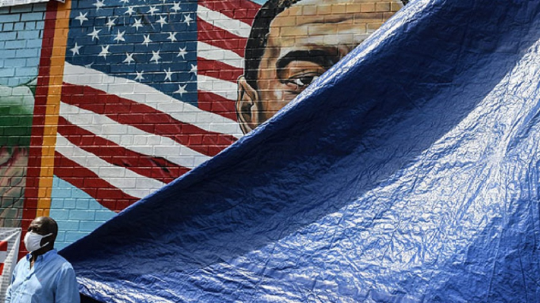The U.S. is Finally Catching up to the Domestic Terrorism Threat
David Ignatius | 30 January 2021
It’s often said that soldiers don’t hear the artillery shell hurtling toward them until it explodes. For most Americans, that was true with the insurgency that detonated at the U.S. Capitol on Jan. 6.
We should have seen it coming: Intelligence reports from local police and the FBI describe a wave of domestic terrorism building through the summer and fall as the United States headed toward the November presidential election. But as is so often the case, law enforcement agencies didn’t take decisive action until too late.
The secondary explosions continue: The Department of Homeland Security issued a domestic terrorism bulletin on Wednesday warning that “ideologically-motivated violent extremists with objections to the exercise of governmental authority . . . could continue to mobilize to incite or commit violence.”
Police and federal law enforcement officials described in interviews this week how they plan to identify and gradually control the violent extremists who invaded the Capitol. Indictments have been filed, and more are coming. The harder question is political: Can the Biden administration create the national unity and will to dismantle this incipient insurgency without driving Donald Trump’s supporters into deeper alienation and potential sedition?
David Kilcullen, a counter terrorism strategist who has studied how insurgencies spread in Afghanistan and other foreign nations, said what’s required at home is a combination of tough, “impartial enforcement” against violent actors, whatever their political views, combined with a subtle process of “disaggregation” that separates the true violent extremists from, say, ordinary Trump supporters.
President Biden must then encourage “reconciliation,” Kilcullen argued, to fulfill his promise to “work as hard for those who voted against me as those who voted for me.” Kilcullen cautioned that inflammatory rhetoric in both directions at an impeachment trial that doesn’t deliver a conviction could make reconciliation even more difficult. “We have weeks, not months,” Kilcullen warned.
Police and FBI officials say the response must begin with a crackdown on those who committed violent acts on Jan. 6. “Arresting people does work” by dissuading people from joining a mob, said John J. Miller, deputy New York police commission for intelligence and counter terrorism. “A mob is a kind of ‘Lord of the Flies’ mentality. People do things as part of a mob they would never do as individuals.”
Intelligence reports trace the roots of the movement that stormed the Capitol. An Oct. 21 report by the New York Police Department warned that “racially and ethnically motivated violent extremists,” such as the Proud Boys, “may be emboldened” by President Donald Trump’s comments “to engage in acts of violence before, during or after the election as well as voter intimidation.” A Nov. 10 report warned that, post-election, “violent extremism . . . will likely increase in the near term, as political and social tensions throughout the country continue to rise.”
Law enforcement knew but did not act. An FBI report the day before the Capitol was stormed quoted one extremist preparing for battle: “Get violent. Stop calling this a march, or rally, or a protest. Go there ready for war,” according to an account in The Post.
An extremist group called the Oath Keepers allegedly helped lead the vanguard. A Jan. 27 Justice Department indictment notes that, in November and December, group members exchanged messages about logistics, lodging and operational planning for Jan. 6. According to the indictment, one of the alleged conspirators proclaimed in a Dec. 30 post: “THIS IS OUR CALL TO ACTION, FRIENDS! SEE YOU ON THE 6TH IN WASHINGTON, D.C.” He posted three days later: “This kettle is set to boil.”
Even the Capitol Police, which allowed the mob to breach its security perimeter, saw an attack coming but couldn’t mobilize to stop it. The Post quoted from an internal Jan. 3 intelligence report: “Congress itself is the target on the 6th . . . there is the possibility that protesters may be inclined to become violent.”
Now that the United States’ eyes are fully open, what will we do to contain domestic terrorism? The first, essential step is accountability. Those who incited or took part in the attack on the Capitol need to pay a price.
Second, we should debate the need for a federal law making domestic terrorism a criminal offense. While some states have such prohibitions, at the federal level, prosecutors must use more general statutes — a limitation that may have hamstrung the FBI in heading off the Jan. 6 insurrection.
Trump supporters complain about “endless wars” fighting insurgencies abroad. But we’re in one now at home. So far, Biden has said and done the right things: stressing unity, reaching out to Trump supporters, avoiding the impeachment firepit and ignoring the disgraced former president. He’s what reconciliation looks like.
Back in 2009, when the Pentagon wanted to send thousands more U.S. troops to pacify Afghanistan, Biden wisely argued no. The United States’ quarrel was with the small group of hardcore terrorists who would attack our nation. If people weren’t engaging in terrorist violence, leave them alone. That’s the right strategy against insurgents — abroad and at home, then and now.
David Ignatius writes a twice-a-week foreign affairs column for The Washington Post.
This article was originally published on The Washington Post.
Views in this article are author’s own and do not necessarily reflect CGS policy.
